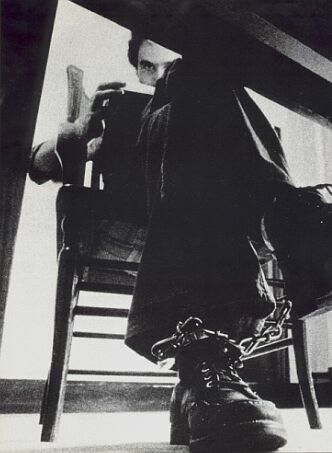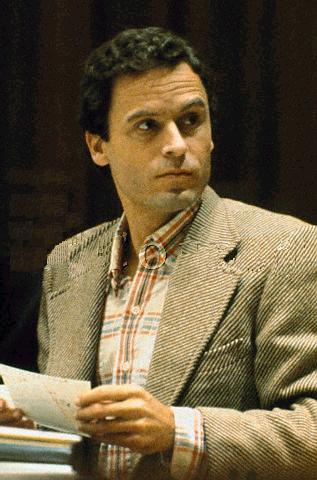|
Ted BundyThere's gonna be people turning up in canyons and there are gonna be people being shot in Salt Lake City because the police there aren't willing to accept what I think they know, and they know that I didn't do these things. If Ted Bundy really hadn't done "those things," today he'd probably be holding elective office. This isn't really much of a stretch. After all, he was already pursuing the political track: paid campaign staffer for his state Republican party, studying to become a lawyer. And he excelled at manipulation. He was handsome, charming, articulate, confident, and friendly. He was as smooth an operator as they come.
So, instead of a long career of soliciting bribes and copulating with interns, Bundy wound up in Florida's electric chair. On the eve of his third execution date, with an appeal still pending before the Supreme Court, he gave an interview to an anti-porn crusader. In it, Ted attributed the cause of his hatred against women to, of all things, pornography:
Do you really feel that hardcore pornography and the doorway to it, softcore pornography, is doing untold damage to other people and causing other women to be abused and killed the way you did? Blaming porn made sense. What other reason was there? It's not like he'd had a troubled childhood or anything. Well... except he did spend the first four months of his life in an orphanage. And, according to extended family members, his father was the crazy and abusive type. Also, there was the small matter of Ted having been separated from his parents at the age of four -- when his (much older) sister moved out-of-state and took him with her for some unfathomable reason. There's no way of knowing whether Ted's disruptive family life left any scars. But something must have happened to him at a young age. In a prior interview he admitted that, as a kid, he had been unable to make friendships or feel empathy for neighbors, classmates, or anyone:
I didn't know what made people want to be friends. I didn't know what made people attractive to one another. I didn't know what underlay social interactions. And then things got even weirder. In his mid-twenties Ted found out that the girl he had known as big sister his whole life was actually his mother, and that Mom and Dad were really his grandparents. He discovered this on his own by researching his birth records; nobody in his family had ever told him. But you really couldn't pin any psychological hangups on that, right? Sounds like a perfectly healthy family dynamic. Bundy stewed for another five years before he began torturing, killing, and mutilating women, then assfucking their corpses. During this time, Ted carried on what appeared to be an exemplary life. He served as a suicide hotline volunteer, joined the Seattle Crime Prevention Council, even authored a booklet on rape prevention.
He escaped from custody twice, before finally winding up on Florida's death row for raping and killing a couple of sorority sisters in Tallahassee. On death row, Ted's escape plan was thwarted by a random inspection, which revealed that he had sawed through the bars of his cell. He and another inmate had planned on taking the night guards hostage. When he wasn't trying to escape, or writing letters to David Berkowitz and John Hinckley, Ted did everything he could to obtain stays of execution. When he started running out of legal appeals, he turned to police departments around the country, offering his knowledge and skills. Bundy volunteered a psychological profile of the Green River Killer to investigators. Ted even held out as a bargaining chip the possibility that he would reveal the locations of his missing victims. Nobody took the bait. But even if they did, it would have required the consent of Florida's governor, who had already shared his feelings about Bundy: "For him to be negotiating for his life over the bodies of victims is despicable." Finally, Ted grasped at his last remaining straw: claiming to have found religion. (Well, more like rediscovered it. He had converted to Mormonism a few years back.) Bundy gave his last interview to a Christian supremacist, Dr. James Dobson of Focus on the Family. Dobson's pet issue was pornography's corrosive effect on men's psyches. It just so happened that Ted agreed with him 100%:
There's no question about it. The FBI's own study on serial homicide shows that the most common interest among serial killers is pornography. Well-meaning, decent people will condemn the behavior of a Ted Bundy, while they're walking past a magazine rack full of the very kinds of things that send young kids down the road to be Ted Bundys. But I'll tell you, there lots of other kids playing in streets around this country today who are going to be dead tomorrow, and the next day, and the next day and month, because other young people are reading the kinds of things and seeing the kinds of things that are available in the media today. Bundy blamed all the torture, rape, and killing on dirty books, thereby absolving himself. In fact, it made out Ted as some kind of pitiable wretch. When Dobson mentioned Kimberly Ann Leach, Ted's 12-year-old victim, Bundy told him that he didn't want to talk about her. But he did mention that he had recently found Jesus. (Wink, wink.) Shortly after that interview, the Supreme Court chose not to grant yet another delay. A crowd gathered outside the prison walls, brandishing frying pans and displaying replica electric chairs. Vendors hawked commemorative t-shirts and other memorabilia. It was a carnival atmosphere, not unlike that of a political party's nominating convention. But instead of supporters, all these people hated the man of the hour. And their enthusiasm was directed toward his looming demise. When the crowd got word that the execution had been carried out, they cheered. Yeah, Bundy would have made a great political candidate. He could really bring out the crowds. |
 But, as the old saying goes, your political career is finished once you're caught in bed with either a dead girl or a live boy. In Ted's case, it was the dead girl. Actually, it was more like 38. At least.
But, as the old saying goes, your political career is finished once you're caught in bed with either a dead girl or a live boy. In Ted's case, it was the dead girl. Actually, it was more like 38. At least.
 He attacked at least a dozen girls in Washington state, and few more in Colorado, and a few more still in Utah. He evaded capture for quite a while, until one of his victims ran away and called the police. Then he finally wound up in jail.
He attacked at least a dozen girls in Washington state, and few more in Colorado, and a few more still in Utah. He evaded capture for quite a while, until one of his victims ran away and called the police. Then he finally wound up in jail.